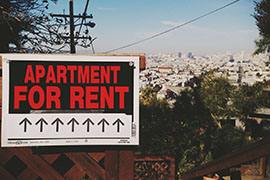- Slug: BC-CNS-Rent Lament,690
- Sidebar: ‘Housing wage’ by county in Arizona.
- Photos, interactive map available (thumbnails, captions, embed code below)
By BRIANNA STEARNS
Cronkite News
WASHINGTON – Minimum-wage workers in Arizona would have to work 70 hours a week, almost two full-time jobs, in order to afford a modest two-bedroom rental home in 2017, a new report says.
The National Low Income Housing Coalition report puts Arizona’s “housing wage” – the hourly rate workers need to earn in a 40-hour week to pay no more than 30 percent of their income toward rent – at $17.56 for a two-bedroom home, well above the state’s new $10-an-hour minimum.
Arizona is not alone: Nowhere in America can minimum-wage workers afford housing without working extra hours, according to the report, “Out of Reach.” Arizona’s $17.56 housing wage was squarely in the middle among states.
“The high cost of rental housing has resulted in more than 11.2 million severely cost-burdened renter households spending more than half of their income on housing,” the report said.
Arizona workers have been helped by an increase in the minimum wage, which rose from $8.05 to $10 an hour on Jan. 1 after voters approved Proposition 206 at the polls last fall. The proposition calls for the wage to continue rising every year until it reaches $12 an hour in 2020.
While that helps, it can still leave working families forced to choose between rent and other necessities, said Val Iverson, executive director of the Arizona Housing Alliance.
“Your rent has to be paid, you can’t skip it,” Iverson said. “So these other things like food, medicine you can cut back at the end of the month if you’re short on cash. Rent, you have to pay or you’re evicted and you’re out on the street.
“So it might help a little bit with the other things they have to cut back on,” she said of the higher minimum wage. “But it’s not going to address the shortage of homes that are affordable to Arizona families.”
The housing wage varies by jurisdiction and in Arizona it ranged from a high of $19.94 in Coconino County for a two-bedroom home to a low of $13.10 in Apache, Greenlee and Santa Cruz counties.
When it came to the renting a one-bedroom home, which the report also measured, Santa Cruz and Greenlee were two of only 12 counties in the nation where the housing wage and minimum wage were the same.
At Arizona’s current $10-an-hour minimum, Coconino County workers would have to put in a full 80 hours in one week to afford a two-bedroom home, the highest workload in the state. Apache, Greenlee and Santa Cruz counties again posted the lowest numbers for the state – but workers there would still have to put in 52 hours per week to afford a two-bedroom home.
The problem is compounded by rising demand for rental housing. A record 43.3 million households were renters in 2016, a 26.5 percent increase from 2006, according to Census Bureau data. Home ownership fell by 5.4 percent in the same period.
“We’re really feeling a lot of pressure on our rental market, and were not creating housing that matching the income levels of Arizonans,” Iverson said. “So a lot of hard-working Arizonans are not being able to find an affordable place to live.”
Nationally, the high demand for rental housing has left only 7.5 million such homes available for the 14.4 million extremely low-income households looking to rent, the report said. That can negate the benefit of living in a place with relatively cheaper rents.
“Jurisdictions with a lower-than-average Housing Wage … are not immune to a shortage of affordable rental homes,” the report said. Places with a lower housing wage “tend to have less vibrant economies and lower-than-average household incomes, meaning a low Housing Wage is still out of reach for too many households,” it said.
When affordable units are found they are often filled with higher-income households leaving only 35 obtainable rental homes available for every 100 low-income renters, according to the NLIHC report.
“We need some system solutions to this, we need insure that hardworking families, seniors, and people with disabilities can find homes that they can afford in this state. And right now they can’t,” Iverson said.
^__=
Web links:
_ “Out of Reach” Report: http://nlihc.org/sites/default/files/oor/OOR_2017.pdf
_ Arizona Housing Alliance: http://azhousingalliance.org/
_ Arizona minimum wage: https://www.azica.gov/labor-minimum-wage-main-page
_ Proposition 206: http://apps.azsos.gov/election/2016/general/ballotmeasuretext/I-24-2016.pdf
_ Interactive map embed code: <script id=”infogram_0__/cAhYQ82UdKwrkJ8V0DSI” title=”NLIHC Housing Wage” src=”//e.infogr.am/js/dist/embed.js?tp4″ type=”text/javascript”></script>
^__=
SIDEBAR:
Rent lament
The National Low Income Housing Coalition calculates a “housing wage” – the hourly rate workers need to work a 40-hour week and not pay more than 30 percent of their income toward rent. For a two-bedroom home in Arizona, workers need to make the following wage or work the following number of hours per week:
– Apache: $13.10/52 hours
– Cochise: $14.37/57 hours
– Coconino: $19.94/80 hours
– Gila: $15.40/62 hours
– Graham: $14.17/57 hours
– Greenlee: $13.10/52 hours
– La Paz: $13.83/55 hours
– Maricopa: $18.15/73 hours
– Mohave: $14.65/59 hours
– Navajo: $14.38/58 hours
– Pima: $16.67/ 67 hours
– Pinal: $18.15/73 hours
– Santa Cruz: $13.10/52 hours
– Yavapai: $17.33/69 hours
– Yuma:$ 16.73/67 hours
– STATEWIDE: $17.56/70 hours
^__=
At the current Arizona minimum wage of $10 an hour, a worker would have to put in 70 hours a week to rent a two-bedroom home without putting more than 30 percent of income toward rent, a new report says. To afford the same house with 40 hours of week, the hourly wage would have to be $17.56. (Photo by Markus Spiering/Creative Commons)
